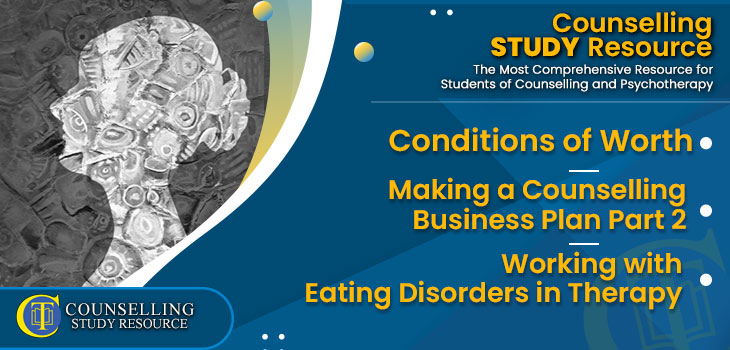236 – Working with Eating Disorders in Therapy
Conditions of Worth – Making a Counselling Business Plan Part 2
In Episode 236 of the Counselling Tutor Podcast, your hosts Rory Lees-Oakes and Ken Kelly are back with this week’s three topics:
- Starting with ‘Theory in Practice’ we’ll look at conditions of worth.
- Then in ‘Practice Partner’ we continue last week’s discussion on business planning.
- And lastly in ‘Practice Matters’, Rory speaks with Kel O’Neill about working with eating disorders in therapy.
Conditions of Worth [starts at 03:04 mins]
Counselling Foundations is sponsored by
Counselling Skills Academy
Learn counselling techniques by seeing counselling skills used in real sessions by qualified therapists.
Real sessions - real-life presentations - real skills.
Linking to last week’s topic of introjected values, this week we look at conditions of worth – how they come to be, and things you as a therapist can do to help your client.
The main points of this discussion are:
- Conditions of worth are most often given to us by our primary caregivers, and can be reinforced by partners, friends or society.
- As well as someone being told they are not worthy, conditions of worth may present themselves differently, e.g. a child who has been told they are ‘clever’ or ‘academic’ may feel a sense of failure if they are suddenly faced with something they struggle with. They have been conditioned to believe that in order to be worthy, they must conform to these standards of ‘clever’ and ‘academic’.
- We live in a world that reinforces the importance of worth e.g. being evaluated on the job you have or the clothes you wear.
- As a counsellor you will help the client to find out who there are, not who they’ve been told they are.
- This might be done through respectful reparenting, or challenging the views they hold of themselves.
- We ultimately know who we are, and clients must learn to live as their own view of themselves rather than others.
- A crucial factor of this will be unconditional positive regard from the counsellor.
Making a Counselling Business Plan Part 2 [starts at 25:40 mins]
In this section, Rory and Ken return for business planning 02 – a continuation of last week’s segment.
The key points of this discussion include:
- Think about who your clients will be: have you trained to work with couples or children and young people? Are you a supervisor who will take on supervisees? If you have done further training in a specialised area, will you use this?
- Consider where your practice will be and the type of clients you’ll be able to work with – will this affect how much you charge? For example if you set up in a wealthy area, people may be happy to pay more for your services.
- Think about your working hours when setting prices – how much time does it take you to travel to and from sessions? Will you be able to place sessions back to back instead of spread over the week in order to cut down travel?
- Consider these things from a position of safety – if you make the decision during the planning process, you place yourself in the best position possible.
- Will you set up a cancellation policy?
- Where will you get your clients from? Are you relying of referrals?
- Doing this planning takes away surprises.
- Try talking to someone already in private practice.
Working with Eating Disorders in Therapy [starts at 40:00 mins]
The National Counselling Society is proud to sponsor Practice Matters.
NCS are really excited to have launched their Children and Young People Therapist Register for counsellors working with the younger age group.
In this week’s ‘Practice Matters’ Rory speaks with Kel O’Neill on why eating disorders should be more widely considered a specialist field.
In this discussion on working with eating disorders in therapy, the main points include:
- The risk is high when working with eating disorders.
- Anorexia has the highest mortality rate of all mental health conditions – as does eating disorders as an umbrella group. This is split between both the medical risk and the risk of suicide.
- It is essential that there is a depth of knowledge on eating disorders when working with them in therapy.
- If you are in doubt of your own knowledge on how to work with eating disorders in therapy, it would be sensible to have specialist supervision or secondary/support supervision with a specialist.
- Get as much of this external and professional view of your practice you can.
- The amount of people struggling with or presenting signs of eating disorders is growing, with the longest seen waiting lists yet.
- Counsellors are going to be seeing more and more clients with eating disorders, and it’s important that there is the knowledge to deal with these clients.


